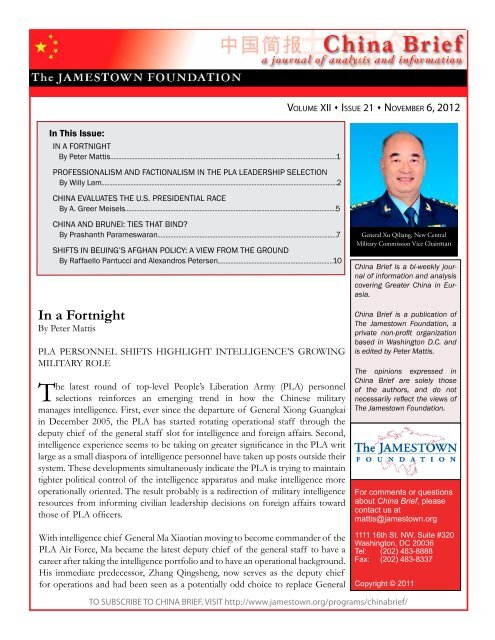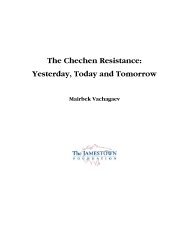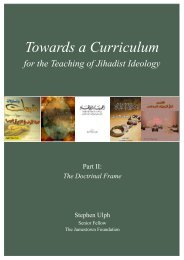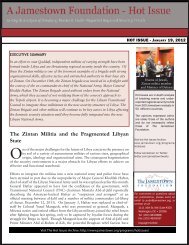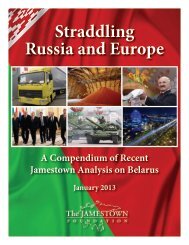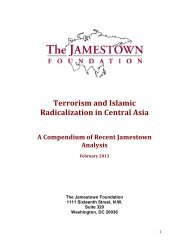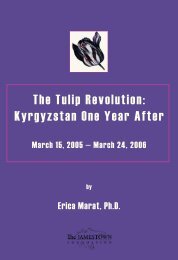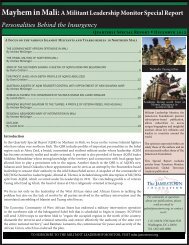ChinaBrief In a Fortnight - The Jamestown Foundation
ChinaBrief In a Fortnight - The Jamestown Foundation
ChinaBrief In a Fortnight - The Jamestown Foundation
You also want an ePaper? Increase the reach of your titles
YUMPU automatically turns print PDFs into web optimized ePapers that Google loves.
<strong>ChinaBrief</strong> Volume XII s Issue 21 s November 6, 2012<br />
Volume XII s Issue 21 s November 6, 2012<br />
<strong>In</strong> This Issue:<br />
<strong>In</strong> a fortnight<br />
By Peter Mattis 1<br />
professionalism and factionalism in the pla leadership selection<br />
By Willy Lam 2<br />
China evaluates the u.s. presidential race<br />
By A. Greer Meisels 5<br />
china and brunei: ties that bind?<br />
By Prashanth Parameswaran 7<br />
shifts in beijing’s afghan policy: a view from the ground<br />
By Raffaello Pantucci and Alexandros Petersen 10<br />
<strong>In</strong> a <strong>Fortnight</strong><br />
By Peter Mattis<br />
PLA Personnel Shifts Highlight <strong>In</strong>telligence’s Growing<br />
Military Role<br />
<strong>The</strong> latest round of top-level People’s Liberation Army (PLA) personnel<br />
selections reinforces an emerging trend in how the Chinese military<br />
manages intelligence. First, ever since the departure of General Xiong Guangkai<br />
in December 2005, the PLA has started rotating operational staff through the<br />
deputy chief of the general staff slot for intelligence and foreign affairs. Second,<br />
intelligence experience seems to be taking on greater significance in the PLA writ<br />
large as a small diaspora of intelligence personnel have taken up posts outside their<br />
system. <strong>The</strong>se developments simultaneously indicate the PLA is trying to maintain<br />
tighter political control of the intelligence apparatus and make intelligence more<br />
operationally oriented. <strong>The</strong> result probably is a redirection of military intelligence<br />
resources from informing civilian leadership decisions on foreign affairs toward<br />
those of PLA officers.<br />
With intelligence chief General Ma Xiaotian moving to become commander of the<br />
PLA Air Force, Ma became the latest deputy chief of the general staff to have a<br />
career after taking the intelligence portfolio and to have an operational background.<br />
His immediate predecessor, Zhang Qingsheng, now serves as the deputy chief<br />
for operations and had been seen as a potentially odd choice to replace General<br />
General Xu Qiliang, New Central<br />
Military Commission Vice Chairman<br />
China Brief is a bi-weekly journal<br />
of information and analysis<br />
covering Greater China in Eurasia.<br />
China Brief is a publication of<br />
<strong>The</strong> <strong>Jamestown</strong> <strong>Foundation</strong>, a<br />
private non-profit organization<br />
based in Washington D.C. and<br />
is edited by Peter Mattis.<br />
<strong>The</strong> opinions expressed in<br />
China Brief are solely those<br />
of the authors, and do not<br />
necessarily reflect the views of<br />
<strong>The</strong> <strong>Jamestown</strong> <strong>Foundation</strong>.<br />
For comments or questions<br />
about China Brief, please<br />
contact us at<br />
mattis@jamestown.org<br />
1111 16th St. NW, Suite #320<br />
Washington, DC 20036<br />
Tel: (202) 483-8888<br />
Fax: (202) 483-8337<br />
Copyright © 2011<br />
TO SUBSCRIBE TO CHINA BRIEF, VISIT http://www.jamestown.org/programs/chinabrief/<br />
1
<strong>ChinaBrief</strong> Volume XII s Issue 21 s November 6, 2012<br />
Xiong. At the time, Zhang had served in a variety of<br />
senior operational and staff positions as well as penned<br />
a number of articles on different PLA priorities (Wen<br />
Wei Po, December 20, 2005; Outlook Weekly, December<br />
9, 2002; PLA Daily, January 30, 2001; January 14, 1997).<br />
Although Ma’s replacement, former political commissar<br />
Wang Guanzhong, is not as operationally experienced<br />
as his two predecessors, Wang’s service in the Central<br />
Military Commission’s (CMC) General Office for the last<br />
16 years should give him a high-level, detailed knowledge<br />
of the PLA and its senior decision-making tempo. Wang<br />
also rose through the ranks of the <strong>In</strong>vestigation and<br />
Research Office (diaoyanju), an experience that probably<br />
gave him a fairly sophisticated knowledge of the state of<br />
the PLA (People’s Net, October 23).<br />
Choosing an outsider to the intelligence system to lead it<br />
helps the PLA keep its intelligence organizations focused<br />
on military priorities and more directly under control.<br />
Previously, career defense attachés like Xiong dominated<br />
the principal military intelligence department, the Second<br />
Department of the PLA General Staff Department<br />
(2PLA). This led to a focus on foreign affairs rather<br />
than military priorities, lending 2PLA the moniker of<br />
“China’s CIA” (Chien Shao [Hong Kong], January 1,<br />
2006). During the 1990s, President Jiang Zemin came to<br />
rely on Xiong and even tried to install him as Minister of<br />
State Security (South China Morning Post, March 18, 1998).<br />
As PLA modernization pushed the military to rely ever<br />
more heavily on intelligence for operations as part of<br />
informatization (xinxihua), Xiong’s continuing presence<br />
through 2006 probably inhibited 2PLA’s adherence to<br />
the rest of the PLA’s modernization program because<br />
he lacked the operational experience. His successors,<br />
however, could not turn the intelligence apparatus into<br />
their private reserve and had the experience to tie military<br />
intelligence more closely to military needs.<br />
Senior PLA intelligence personnel also have been<br />
spreading out, suggesting this experience is being valued<br />
in the PLA as it was not previously. <strong>The</strong> first to make<br />
the jump was Assistant Chief of the General Staff Chen<br />
Xiaogong, who moved to become one of the PLA Air<br />
Force deputy commanders in 2009. This transfer may<br />
have been politically motivated to prevent the emergence<br />
of another Xiong, because, after his stint in the party’s<br />
Foreign Affairs Office, Chen was rumored to be close<br />
with Hu Jintao (People’s Net, October 23; “Personnel<br />
2<br />
Changes in PLA Ranks: Chen Xiaogang,” China Brief,<br />
February 9, 2009; Ming Pao, January 21, 2009). Since then,<br />
Chen’s successor at 2PLA, Yang Hui, was promoted to be<br />
chief of staff of the Nanjing Military Region. At the same<br />
time, the last signals intelligence leadership, including<br />
both the commander and the political commissar, also<br />
moved on. <strong>The</strong> commander, Wu Guohua, became deputy<br />
commander of the Second Artillery, and the political<br />
commissar, Wang Yongsheng, became a vice president<br />
at National Defense University (Global Times, August 5,<br />
2011).<br />
<strong>In</strong>formation is at the heart of the PLA’s modernization<br />
program, so the rising importance of intelligence posts<br />
relative to their previous stature within the military<br />
should not be surprising. According to the PLA Daily<br />
and other writings on informatization, the challenges<br />
of fighting under informatized conditions require more<br />
efficient and effective means of collecting, processing<br />
and distributing intelligence. This also means integrating<br />
intelligence deeper into PLA operations transitioning<br />
away from a top-down intelligence distribution system<br />
(PLA Daily, October 28, 2008). Consolidation of this<br />
personnel trend at lower levels—such as operational<br />
rotations for mid-career intelligence personnel or new<br />
emphasis on intelligence-related education—would be<br />
the most important sign that intelligence is taking on<br />
greater relevance for the PLA at all levels.<br />
Peter Mattis is Editor of China Brief at <strong>The</strong> <strong>Jamestown</strong><br />
<strong>Foundation</strong>.<br />
***<br />
Professionalism and Factionalism<br />
in the PLA Leadership Selection<br />
By Willy Lam<br />
<strong>The</strong> Beijing leadership has reshuffled the high command<br />
of the People’s Liberation Army (PLA) as the military<br />
goes through its own leadership transition separate from<br />
but linked to the 18th Party Congress beginning later this<br />
week. <strong>The</strong> move, which was announced last week, has also<br />
given hints about the reorganization of the policy-setting<br />
Central Military Commission (CMC). <strong>The</strong> membership<br />
of a much rejuvenated CMC will be confirmed by the
<strong>ChinaBrief</strong> Volume XII s Issue 21 s November 6, 2012<br />
18th Chinese Communist Party (CCP) Congress, which<br />
is due to open on November 8. Although this round<br />
of personnel selection reinforces the PLA’s increasing<br />
dedication to professionalism in its upper echelons, this<br />
series of personnel changes also reflects intense horsetrading<br />
among the party’s principal factions.<br />
<strong>The</strong> new chiefs of the “Four General Departments”—<br />
the General Staff Department (GSD), General Political<br />
Department (GPD), General Logistics Department<br />
(GLD) and General Armaments Department (GAD)—<br />
are respectively General Fang Fenghui (age 61); General<br />
Zhang Yang (age 61); General Zhao Keshi (age 65); and<br />
General Zhang Youxia (age 62). Moreover, General Ma<br />
Xiaotian, (age 63) and General Wei Fenghe (age 58) have<br />
been appointed Commander of respectively the Air<br />
Force and the Second Artillery Corps. <strong>The</strong> incumbent<br />
Commander of the Navy, Wu Shengli (age 67) is<br />
expected to remain in his post for the foreseeable future.<br />
Also named were a dozen-odd new deputy and assistant<br />
chiefs of the headquarters units as well as the Navy, Air<br />
Force and Second Artillery Corps (PLA Daily, October<br />
25; China News Service, October 25).<br />
<strong>The</strong> chiefs of the four general departments as well as the<br />
three military divisions will become ordinary members<br />
of the CMC. Uncertainties, however, still hang over<br />
the identities of the top CMC leadership. According to<br />
reports out of Beijing and Hong Kong, President Hu<br />
(age 69) will stay on as CMC chairman for at least two<br />
years beyond his retirement from the Politburo and<br />
the Central Committee at the 18th CCP Congress. <strong>The</strong><br />
precedent for this in the post-revolutionary generation<br />
was set by ex-president Jiang Zemin, who continued<br />
being CMC chair for almost two years after his retirement<br />
from all other party slots at the 16th Party Congress in<br />
2002. This means that Vice President Xi Jinping, (age<br />
59) who is slated to soon replace Hu as CCP general<br />
secretary, will remain CMC vice chairman for the time<br />
being. <strong>The</strong> two new CMC vice chairmen are former PLA<br />
Air Force Commander General Xu Qiliang (age 62) and<br />
Commander of the Jinan Military Region General Fan<br />
Changlong (age 65). <strong>The</strong> newly retired GAD Director,<br />
General Chang Wanquan (age 63) is set to replace<br />
General Liang Guanglie as Defense Minister (Xinhua,<br />
November 4; Wen Wei Po [Hong Kong] October 26; South<br />
China Morning Post, October 26; Apple Daily [Hong Kong]<br />
October 25).<br />
3<br />
<strong>The</strong> just-named Chief of the General Staff General<br />
Fang perhaps best exemplifies the new generation of<br />
professionally savvy officers. Fang, a native of Shaanxi<br />
Province and graduate of the elite National Defense<br />
University, was the youngest of China’s seven regional<br />
commanders when he was given the No. 1 post of the<br />
Beijing Military Region (MR) in 2007. Apart from his<br />
command-and-control skills, Fang is a much-published<br />
author on military strategy, particularly in the areas of<br />
computer-aided war games and the synchronization of<br />
different branches of the military forces. One of General<br />
Fang’s favorite mottoes is that “radically changing times<br />
demand innovation in strategic theories.” President Hu<br />
was said to be very impressed with Fang’s orchestration<br />
of the 2009 military parade in Bejing, which marked<br />
the 60th anniversary of the founding of the People’s<br />
Republic. Last year, Fang won plaudits when he supervised<br />
complicated-scale maneuvers involving more than 30,000<br />
soldiers from the Beijing, Lanzhou and Chengdu MRs.<br />
While the great majority of his predecessors as Beijing<br />
MR commander went into retirement after serving in this<br />
sensitive position, General Fang seems to have a bright<br />
future ahead of him (Ta Kung Pao [Hong Kong] October<br />
26; Southern Metropolitan News [Guangzhou] October 25;<br />
Ifeng.com [Beijing], August 29, 2011).<br />
Two hot contenders for the post of GDP director lost<br />
out apparently due to their close association with the<br />
disgraced Politburo member and Chongqing Party<br />
Secretary Bo Xilai. <strong>The</strong>y are the Political Commissar of<br />
the General Logistics Department General Liu Yuan (age<br />
61) and the Political Commissar of the Second Artillery<br />
Corps General Zhang Haiyang (age 63). Like Bo, who is<br />
the son of revolutionary hero Bo Yibo, Generals Liu and<br />
Zhang are deemed high-profile princelings. General Liu<br />
is the son of the late state president Liu Shaoqi, while<br />
General Zhang is the son of former Politburo member<br />
General Zhang Zhen. While Bo has never served in the<br />
PLA, he has a large following amongst the “princeling<br />
generals.” <strong>The</strong> charismatic former Politburo member<br />
is due to be put on trial for alleged crimes including<br />
large-scale corruption and dereliction of duty (Sing Tao<br />
Daily [Hong Kong] October 24; Ming Pao [Hong Kong]<br />
October 24).<br />
After Bo was detained by authorities in mid-March, PLA<br />
disciplinary authorities have run numerous campaigns<br />
to promote the ideal of “the party’s absolute leadership
<strong>ChinaBrief</strong> Volume XII s Issue 21 s November 6, 2012<br />
over the army.” An August 1 Army Day commentary in<br />
the PLA Daily made an unusual reference to the army’s<br />
immunity against being manipulated by “ambitious<br />
careerists” in the mould of Bo. “<strong>In</strong> the midst of even<br />
the most dangerous situations, not a single troop in<br />
our army’s history has mutineered or surrendered to<br />
the enemy,” said the Daily commentary, “And not even<br />
the most cunning and ambitious careerist has been able<br />
to use the army to realize his conspiracy” (PLA Daily,<br />
August 1; Xinhua, August 1). <strong>In</strong> a talk last month, then-<br />
CMC Vice Chairman Xu Caihou urged officers and<br />
soldiers to “ensure that the troops must uphold a high<br />
level of unison with the central party leadership and the<br />
CMC in the areas of thought and politics.” Xu added<br />
“We must resolutely listen to the directions of the party<br />
central leadership, the CMC and Chairman Hu” (Xinhua,<br />
October 11; PLA Daily, October 11).<br />
<strong>In</strong> terms of factional dynamics, President Hu seems to be<br />
a major beneficiary of the reshuffle. Apart from Chief of<br />
the General Staff General Fang, GPD Director General<br />
Zhang is said to be close to the supremo. Given that the<br />
GDP controls functions including appointments and<br />
discipline, Hu may through his close ties with General<br />
Zhang be able to maintain some say in personnel<br />
matters even after his departure from the CMC. Hu’s<br />
clout also is evidenced by the surprise appointment of<br />
another protégé, the relatively inexperienced Hong Kong<br />
Garrison commander Zhang Shibo, as General Fang’s<br />
successor as Beijing MR commander. Before assuming<br />
the Hong Kong posting in late 2007, Zhang, a 60 year-old<br />
lieutenant general, was commander of the 20th Group<br />
Army (Apple Daily, October 26; Sina.com, October 24].<br />
Other appointments may reflect the preferences of expresident<br />
Jiang and Vice President Xi. <strong>The</strong> probable<br />
promotion of Jinan MR Commander General Fan to the<br />
CMC vice chairmanship reflects Jiang’s residual influence.<br />
General Fan is the protégé of soon-to-retire CMC Vice<br />
Chairman General Xu, who is deemed Jiang’s “unofficial<br />
representative” in the CMC. Both Generals Xu and Fan<br />
had served for long periods in the 16th Group Army.<br />
Earlier this year, General Fan (age 65) was expected to<br />
be leaving the armed forces after having reached the<br />
mandatory retirement age for regional commanders. Xi’s<br />
influence in the PLA has been adversely affected by the<br />
fact that the career of several princeling generals has been<br />
hurt by their association with Bo Xilai. New Air Force<br />
4<br />
commander General Ma Xiaotian and GAD Director<br />
General Zhang Youxia, however, are notable princelings.<br />
General Zhang is thought to be particularly close to Xi.<br />
<strong>The</strong> fathers of Xi and General Zhang, respectively Xi<br />
Zhongxun and General Zhang Zongxun were close allies<br />
when both worked in northwestern China before the<br />
CCP came into power in 1949 (Ming Pao, October 25;<br />
Sing Tao Daily, October 25).<br />
<strong>The</strong> marathon reshuffles also have followed the tradition<br />
begun by President Hu of the frequent movement of<br />
personnel not only across different military divisions<br />
but also from headquarters to the regions. For example,<br />
the Political Commissar of the Chengdu MR, General<br />
Tian Xiusi, was made the Political Commissar of the Air<br />
Force. Assistant GPD Director General Wei Liangzhong<br />
became the Political Commissar of the Guangzhou MR,<br />
while General Wang Guanzhong, the veteran Director of<br />
the PLA General Office, was appointed a Deputy Chief<br />
of the GSD (Ming Pao, October 26; Ta Kung Pao, October<br />
25). Also notable are the proverbial “helicopter rides”<br />
taken by the likes of General Fan of the Jinan MR and<br />
General Zhang of the Hong Kong Garrison. It is very<br />
rare for a regional commander to be elevated directly<br />
to CMC vice chairman. General Zhang’s promotion to<br />
the post of Beijing MR Commander is also unusual. <strong>In</strong><br />
light of the importance of the Beijing MR, only officers<br />
who had held senior posts such as deputy commander or<br />
chief of the general staff of the country’s seven MRs had<br />
been named to that sensitive slot (Ta Kung Pao, October<br />
24; Apple Daily, October 24).<br />
Given that factional loyalty is a key consideration behind<br />
the on-going personnel movements, it is perhaps not<br />
surprising that not as much priority has been given to<br />
weeding out corruption in the military. This is despite<br />
the fact that General Liu Yuan–one of the high-profile<br />
losers in the promotion sweepstakes–was praised highly<br />
for initiating an anti-graft campaign within the GLD<br />
early this year. Senior Colonel Liu Mingfu, a professor<br />
at the National Defense University and a respected<br />
military commentator, pointed out recently that “corrupt<br />
generals” were an even more serious problem than<br />
“corrupt cadres.” Last month, Liu said “Corruption is<br />
the only force that can defeat the PLA.” “Yet the forces<br />
of corruption are more powerful than those of fighting<br />
corruption,” he added. “And perpetrators of corruption<br />
are more resourceful than graft busters” (Wen Wei Po,
<strong>ChinaBrief</strong> Volume XII s Issue 21 s November 6, 2012<br />
October 8; Sina.com, October 8). <strong>The</strong> onus is on the<br />
post-18th Party Congress leadership to demonstrate<br />
that members of the newly promoted top brass live up<br />
to the oft-repeated motto of decai jianbei, that is, “having<br />
high moral attributes as well as being professionally<br />
competent.”<br />
Willy Wo-Lap Lam, Ph.D., is a Senior Fellow at <strong>The</strong> <strong>Jamestown</strong><br />
<strong>Foundation</strong>. He has worked in senior editorial positions in<br />
international media including Asiaweek newsmagazine, South<br />
China Morning Post and the Asia-Pacific Headquarters of<br />
CNN. He is the author of five books on China, including the<br />
recently published Chinese Politics in the Hu Jintao Era: New<br />
Leaders, New Challenges. Lam is an Adjunct Professor of<br />
China studies at Akita <strong>In</strong>ternational University, Japan, and at the<br />
Chinese University of Hong Kong.<br />
***<br />
China Evaluates the U.S.<br />
Presidential Race<br />
By A. Greer Meisels<br />
China watchers in the United States have devoted<br />
the better part of this year to understanding the<br />
dynamics and vagaries of the once-a-decade power<br />
transition that will take place in China later this month.<br />
Questions surrounding whether or not the fifth<br />
generation leaders will usher in a new era of political and<br />
economic reform, which “factions” will gain the upperhand<br />
in the Politburo’s Standing Committee, and what<br />
the heir apparent, Xi Jinping’s, views are on the U.S.-<br />
China relationship have been fodder for pundits and<br />
analysts alike. Yet curiously, the same level of scrutiny<br />
about the potential U.S. leadership transition does not<br />
appear to be present on the Chinese side. Questions<br />
about which candidate might help improve U.S.-China<br />
relations, or which candidate might be more amenable to<br />
Beijing seem rarely asked. <strong>In</strong>stead, one is confronted with<br />
what could be described as election fatigue with Chinese<br />
characteristics. This statement by foreign ministry<br />
spokesman, Hong Lei, sums it up well: “We hope the<br />
U.S. Republican and Democratic candidates will get rid<br />
of the impact of election politics and do more things<br />
conducive to China-U.S. mutual trust and cooperation”<br />
5<br />
(Global Times, October 18).<br />
During a recent private conversation with a leading U.S.<br />
studies scholar from the China <strong>In</strong>stitutes of Contemporary<br />
<strong>In</strong>ternational Relations (CICIR), he remarked “Its<br />
strange that the U.S. presidential election this year is<br />
not a very hot topic among pundits in Beijing. Probably<br />
there are other hot spots like the South China Sea.” It<br />
is true that this has been a challenging year for China.<br />
<strong>The</strong>re have been several high-profile political scandals<br />
and an up-tick in the number of disputes with some of<br />
her neighbors in the South and East China Seas. It is not,<br />
however, that these other issues have obviated the need<br />
for China to report on the U.S. presidential campaign.<br />
What is becoming clear is that a two-pronged approach<br />
has developed with regard to how China is covering the<br />
campaign and the elections this time around. Rather<br />
than discuss what could be at stake for China should the<br />
United States see a second-term Obama administration<br />
or a Mitt Romney-led Republican administration in the<br />
White House, the narrative revolves around either the<br />
dangers of playing the “China card,” which is considered<br />
by many to be “both ridiculous and meaningless” or the<br />
fact that there is not a substantial difference between<br />
either candidate when it comes to China policy (Xinhua,<br />
September 9, 2011).<br />
How Do This Year’s Candidates Play the “China<br />
Card?”<br />
Coverage of the U.S. presidential elections in China seem<br />
tinged with a sense of resignation that China-bashing has<br />
become part of the U.S. political landscape—some go as<br />
far as to refer to it as a ritual. Chinese analysts, however,<br />
concede that this ritual “negatively impacts China-U.S.<br />
relations and leaves Americans with the impression that<br />
China is responsible for their country’s decline” (Xinhua,<br />
October 18). <strong>In</strong> fact, playing the “China card,” “Chinabashing”<br />
or “scapegoating” has become so ubiquitous<br />
that it seems simply expected. Though numerous articles<br />
opine that China is not the source of U.S. economic woes,<br />
they also admit that the politicization (zhengzhihua) of<br />
topics such as the economy and unemployment is simply<br />
part and parcel of today’s U.S. election campaign (Caixun,<br />
July 19; Xinhua, November 14, 2011).<br />
This should not imply, however, that people in China are<br />
not paying attention to the claims these two candidates<br />
are making. For example, Mitt Romney’s frequent
<strong>ChinaBrief</strong> Volume XII s Issue 21 s November 6, 2012<br />
promises to label China as a currency manipulator the<br />
first day he is in office has received a lot of coverage. By<br />
and large, Mr. Romney has been cited as sounding rather<br />
vociferous when it comes to China’s trade and economic<br />
practices with some mentioning “Romney’s willful<br />
attacks on China…” (Xinhua, October 17). But what is<br />
more interesting is that some of the candidate’s doublespeak,<br />
or change of position, has also been brought to<br />
light. For example, Mitt Romney visited China back in<br />
2006 while still governor of Massachusetts and, at that<br />
time, made several statements about how the United<br />
States should seek cooperation with China based on free<br />
trade principles and how he admired the Chinese for<br />
their strong work ethic (People’s Daily, November 8, 2011).<br />
Certain Chinese feel this is a far cry from the China policy<br />
that is outlined on his official campaign website which<br />
could be considered “an outdated manifestation of a Cold<br />
War mentality” (China Daily, August 27). <strong>The</strong>se changes<br />
in tune or “capriciousness” have been “attributed to the<br />
deeply rooted bad habits of the U.S. political nature. <strong>The</strong><br />
United States is a country that needs to find rivals at any<br />
time and everywhere” (People’s Daily, November 8, 2011).<br />
<strong>In</strong> other words, the strident language used by presidential<br />
candidates is seen more as a manifestation of the flaws in<br />
the American political tradition, rather than expressions<br />
of a candidate’s actual beliefs.<br />
President Barack Obama is not immune to this sort of<br />
criticism either. For example, some have made note of<br />
his “strong moves against China, including imposing<br />
high tariffs on Chinese products, rejecting Chinese<br />
companies’ investment in the United States, and filing<br />
trade cases with the World Trade Organization against<br />
Chinese companies” (Guangzhou Daily, October 18). <strong>In</strong><br />
China, there also seems to be an understanding that<br />
most incumbent presidents, including Obama, engage<br />
in credit-claiming. Several jabs have been made about<br />
how President Obama used the debates as a platform to<br />
demonstrate his “success” in getting the Chinese yuan<br />
to appreciate “because we have pushed them hard...”<br />
(Xinhua, October 17).<br />
President Obama and Mitt Romney, thus, are both seen<br />
as focusing more on “partisan self-interest” rather than<br />
on the potential adverse affects their rhetoric may have<br />
on the U.S.-China relationship, writ large (Hexun, July<br />
11).<br />
6<br />
<strong>The</strong> Pendulum Always Swings Back to the Middle<br />
<strong>The</strong> other point that gets emphasized is that no matter<br />
which party or president is in power, the U.S.-China<br />
relationship has been fairly consistent (with some rough<br />
patches now and again) since the two countries ushered<br />
in a new era of diplomatic relations forty years ago.<br />
As Xie Tao wrote, “…from Richard Nixon to Barack<br />
Obama, the dominant trend of U.S. China policy has<br />
been one of remarkable continuity. Barring extraordinary<br />
circumstances, if there was any noticeable change at all, it<br />
was often more of fine-tuning than a bolt of lightning”<br />
(China Daily, April 27). Consequently, even though there<br />
is a tradition of the opposition candidate campaigning<br />
for president by underscoring the incumbent’s so-called<br />
“weakness” on China— few seem concerned that this<br />
will translate into actual pugnacity once in the Oval<br />
Office. For instance, when Clinton was running for office,<br />
he attacked George H.W. Bush as being too weak on<br />
China; and when George W. Bush was on the campaign<br />
trail, he used the same rhetoric to describe the Clinton<br />
administration. Obama used the word “coward” when<br />
describing some of the latter Bush’s China policies, and<br />
today Romney is using the same tactics against Obama<br />
(Beijing News, July 31). It should then come as no surprise<br />
that China does not dissect each and every utterance<br />
made by an U.S. presidential candidate with a fine-toothed<br />
comb. After all, “No matter who wins the election, every<br />
U.S. president… attaches great importance to the China-<br />
U.S. relations. <strong>In</strong> other words, China-bashing is nothing<br />
but a topic which aims to attract the public attention”<br />
(Chinamil.com.cn, October 24).<br />
On the other hand, though Chinese observers of U.S.<br />
politics might appear analytically complacent when<br />
it comes to the presidential elections, this should not<br />
imply that they do not closely follow the policies and<br />
pronouncements that come out of the White House.<br />
One such case in point is the U.S. “pivot” or “re-balance”<br />
to Asia. Though some here in the United States might<br />
dismiss this strategy as more slogan than substance at this<br />
point, Chinese analysts have paid very close attention to<br />
nearly every official and semi-official statement on the<br />
topic. Some remark that the U.S. strategic rebalancing to<br />
Asia has damaged trust and urge the U.S. to “… make<br />
its strategic rebalancing less provocative…” and that<br />
no matter which candidate wins the election, how they<br />
handle relations with China and how they work to build
<strong>ChinaBrief</strong> Volume XII s Issue 21 s November 6, 2012<br />
strategic resassurance will be critically important (China<br />
Daily, November 1; “Pivot and Parry: China’s Response to<br />
America’s New Defense Strategy,” China Brief, March 15).<br />
<strong>The</strong>refore, though some like Niu Xinchun of CICIR may<br />
conclude that during this election season both Obama<br />
and Romney are doing little more than attempting “to<br />
score political points by attacking China. I don’t think<br />
they will really follow through on some of their campaign<br />
rhetoric if they are elected,” it seems difficult to square<br />
the circle with those analysts who so carefully scrutinize<br />
the statements that come from the administration once in<br />
office (Global Times, October 18).<br />
<strong>The</strong> Role of Domestic Politics in Foreign Policy<br />
Formulation<br />
Finally, it appears as if the Chinese may be suffering, to<br />
a certain extent, from the same disease which they claim<br />
plagues many Americans; namely, that they underestimate<br />
the role domestic politics plays when it comes to the<br />
current election-year rhetoric and “would-be” policies of<br />
future U.S. presidents. <strong>In</strong> the recently released Pew Global<br />
Attitudes report on how the U.S. and Chinese publics<br />
view each other, “the top concern of Americans—cited<br />
by 78 percent—is the large amount of American debt<br />
held by China. About seven-in-ten (71 percent) say the<br />
loss of U.S. jobs to China is a very serious problem for<br />
the [United States] and 61 percent say the same about<br />
the trade deficit with China” [1]. Yet when Obama and<br />
Romney make statements about debt-rebalancing and<br />
fears about job loss to China, most Chinese analysts see<br />
this as mere politicking as opposed to a true reflection<br />
of the concerns being voiced by the American people.<br />
Hence, instead of viewing candidates’ strong statements<br />
on China as little more than “a handy tool for U.S.<br />
politicians who try to court the votes and support<br />
of ill-informed voters by ratcheting up antagonistic<br />
sentiment toward China,” perhaps it is important for<br />
them to recognize that these statements are sometimes<br />
manifestations of domestic sentiment, whether wellinformed<br />
or not (Xinhua, September 14). Conceivably<br />
then, it would be worthwhile for analysts in Beijing to not<br />
only pay attention to elite opinions and statements, but<br />
also to perform more rigorous analysis of the domestic<br />
U.S. political environment since it may prove to be a<br />
harbinger for how the U.S.-China relationship evolves in<br />
the future.<br />
7<br />
A. Greer Meisels is the Associate Director and Research Fellow,<br />
China and the Pacific, at the Center for the National <strong>In</strong>terest.<br />
Notes:<br />
1. Bruce Drake, “American, Chinese Publics<br />
<strong>In</strong>creasingly Wary of the Other,” Pew Research<br />
Center, November 1, 2012, available online<br />
.<br />
***<br />
China and Brunei: Ties that Bind?<br />
By Prashanth Parameswaran<br />
When Chinese President Hu Jintao met Brunei’s<br />
Sultan Hassanal Bolkiah on the sidelines of the<br />
Asia-Pacific Economic Cooperation (APEC) meeting<br />
this September in Russia, both leaders said they were<br />
pleased with the development of bilateral ties in recent<br />
years (Xinhua, September 8). Though relations between<br />
Beijing and Bandar Seri Begawan have strengthened<br />
considerably over the last few years, the future could pose<br />
challenges that both sides will have to navigate in order to<br />
preserve these close ties.<br />
Sino-Brunei relations are deeply rooted in history and<br />
date back over 2,000 years. <strong>The</strong> two sides traded as early<br />
as China’s Western Han Dynasty, and some accounts<br />
suggest Chinese settlers from Fujian province arrived<br />
in Borneo and settled in the area now called Brunei in<br />
the 13th and 14th centuries. Brunei’s Sultan Abdul Majid<br />
Hassan, who died during his travels in China in the early<br />
15th century despite the Chinese emperor’s best efforts<br />
to help treat his illness, was buried with royal tribute in<br />
Nanjing and continues to serve as a living symbol of the<br />
relationship today (Brunei Times, November 9, 2008). <strong>In</strong><br />
more recent times, however, relations were somewhat<br />
distant as Brunei was a British protectorate for most of<br />
the last century until it gained independence in 1983. Even<br />
then, due to various concerns including communism<br />
and sensitivities related to its ethnic Chinese population,<br />
Brunei on September 30, 1991, was then the last member<br />
of the Association of Southeast Asian Nations (ASEAN)
<strong>ChinaBrief</strong> Volume XII s Issue 21 s November 6, 2012<br />
to establish official ties with Beijing.<br />
Since then, China increasingly has seen Brunei as a useful<br />
source of oil and gas to fuel its economic growth and a<br />
voice for better ties between it and ASEAN. Meanwhile,<br />
Brunei, an Islamic sultanate with a population of 400,000<br />
and the fifth richest country in the world per capita,<br />
has considered Beijing to be a crucial partner to engage<br />
to both diversify and strengthen its fossil-fuel-based<br />
economy and preserve peace and stability in the Asia-<br />
Pacific region.<br />
While relations between the two countries have tightened<br />
over the last decade or so, the last year has seen a<br />
particular increase in the momentum of the relationship<br />
ahead of Brunei’s chairmanship of ASEAN in 2013. Last<br />
November, Wen Jiabao became the first Chinese premier<br />
to visit Brunei in the history of the bilateral relationship,<br />
and both sides celebrated the 20th anniversary of<br />
the establishment of diplomatic relations with great<br />
fanfare. Wen’s visit began what the Brunei Times called<br />
“a whole new chapter” in Sino-Brunei relations (Brunei<br />
Times, November 23, 2011). This year, the chairman of<br />
the Chinese People’s Political Consultative Conference<br />
(CPPCC) Jia Qinglin paid the first visit of its kind to<br />
Brunei in April, and Chinese Foreign Minister Yang Jiechi<br />
also visited in August (Xinhua, August 11; People’s Daily,<br />
April 20). Top officials also have met on the sidelines of<br />
key meetings, as Chinese President Hu Jintao and Brunei’s<br />
Sultan Hassanal Bolkiah most recently did at APEC.<br />
Commercial relations have strengthened considerably,<br />
as well. Trade in 2011 soared to $1.3 billion, nearly four<br />
times what it was in 2008 and surpassing the $1 billion<br />
target set by the two countries previously (Minister of<br />
Foreign Affairs and Trade, Brunei Darussalam, 2012).<br />
<strong>The</strong> bulk of that is in energy, which is not surprising<br />
since Beijing needs to fuel its rapid growth while Brunei is<br />
Southeast Asia’s third largest oil exporter and the world’s<br />
fourth largest natural gas exporter. Soon after Wen’s<br />
visit to Brunei in 2011, for example, Brunei agreed to<br />
increase oil exports to China from 13,000 barrels per day<br />
to 16,000 barrels per day. Meanwhile, China’s National<br />
Offshore Oil Corp (CNOOC) has inked a deal with<br />
Petroleum Brunei for oil and gas commercial exploration,<br />
while Zhejiang Henyi Group and Sinopec Engineering<br />
<strong>In</strong>c. currently are working to help develop an oil refinery<br />
and aromatic cracker plant in Brunei to boost the energy<br />
8<br />
sector in the largest ever foreign direct investment in the<br />
country (China Daily, July 19).<br />
Both sides increasingly have tried to broaden the reach of<br />
their cooperation beyond energy. Within the economic<br />
realm, the two countries signed a Memorandum of<br />
Understanding (MoU) to boost cooperation in agriculture<br />
in April. Apart from increased trade, the MoU also included<br />
more joint efforts in human resource development<br />
and providing training for government officials and<br />
professional technical personnel (Brunei Times, April 20).<br />
Both sides have tried to encourage greater investment<br />
and private sector interaction. Beijing has signaled that<br />
it would like small and medium enterprises (SMEs) from<br />
Brunei to invest in “lesser developed” parts of China,<br />
while Bandar Seri Begawan has tried to get Beijing to<br />
broaden its range of investments in the country through<br />
a range of trade fairs, expositions and symposiums. A<br />
recent National Chamber of Commerce and <strong>In</strong>dustry<br />
(NCCI) meeting in Brunei, for instance, saw a Chinese<br />
delegation comprising government representatives from<br />
various industries including real estate, construction,<br />
medicine, and gem and jade (Brunei Times, October 26).<br />
Cooperation also has been recently extended to the city<br />
level, with Nanjing and Bandar Seri Begawan becoming<br />
sister cities last year—an arrangement that is expected to<br />
boost tourism and cultural activities.<br />
China and Brunei also continue to place a great emphasis<br />
on people-to-people ties, which CPPCC Chairman Jia<br />
Qinglin singled out as one of the four ways to enhance<br />
bilateral cooperation during his visit earlier this year<br />
(Xinhua, April 20). For Brunei, the main focus is on<br />
tourism because aside from its ASEAN neighbors, China<br />
brings the most tourists into Brunei (Brunei Times, June<br />
8). Beijing and Bandar Seri Begawan have also both been<br />
paying increasing attention to the role of youth in bilateral<br />
ties. Chinese youth groups have paid visits to Brunei, and<br />
the Universiti Brunei Darussalam and Zhejiang University<br />
forged an official partnership in July this year, initiatives<br />
that not only cement inter-generational ties between the<br />
two nations, but also potentially could provide Brunei<br />
with young investors or graduates interested in working<br />
or doing business there (Xinhua, July 20; Brunei Times,<br />
April 24, 2011). <strong>The</strong> ceremonial dimension of peopleto-people<br />
ties also should not be overlooked. China<br />
continues to invest a great deal in emphasizing the rich<br />
history of the relationship, promoting the China-Brunei
<strong>ChinaBrief</strong> Volume XII s Issue 21 s November 6, 2012<br />
Friendship Hall completed in 2006 and the Brunei<br />
Heritage Garden unveiled in 2008—both of which are<br />
located in Nanjing where the former Brunei sultan is<br />
buried. For Brunei’s part, the Brunei-China Friendship<br />
Association founded in 2006 continues to promote ties<br />
through events including cultural exchanges and exhibits.<br />
Yet, despite the great strides in Sino-Brunei relations<br />
over the past few years, the relationship still has its<br />
limits, which could pose challenges for both sides in the<br />
coming years. First and most obviously, China is only one<br />
of Brunei’s key partners, and the sultanate has boosted<br />
its relationships with a wide variety of actors over the<br />
past few years ranging from the United States and the<br />
European Union to the its ASEAN neighbors and Russia<br />
in order to diversify its options. While this is natural,<br />
it is a tricky balancing act to maintain, particularly for<br />
a very small country that is trying to manage ties with<br />
much larger powers and is acutely sensitive to fears of<br />
entrapment or abandonment. What would happen if, for<br />
instance, tensions between Washington and Beijing should<br />
increase in the Asia-Pacific in the future? Bandar Seri<br />
Begawan would find itself in the middle of a great power<br />
rivalry and potentially have to choose sides, which could<br />
pose challenges for its diversification strategy. Neither<br />
the United States nor China would like being spurned,<br />
and Beijing in particular has demonstrated its tendency to<br />
use economic coercion in certain circumstances to make<br />
its displeasure known [1].<br />
Second, Brunei’s preferred low-key approach to dealing<br />
with contentious issues may be challenged as it assumes a<br />
very public role as ASEAN chair in 2013, at a crucial time<br />
for the organization. <strong>The</strong> country has a long tradition of<br />
avoiding confrontation and trying to resolve differences<br />
peacefully with mutual respect and consensus as embodied<br />
in the approach of its foreign minister, Prince Mohamed<br />
Bolkiah [2]. For instance, despite having a sovereignty<br />
claim over the Louisa Reef, a small atoll in the South<br />
China Sea that overlaps with Chinese (and Malaysian)<br />
claims, the sultanate has not occupied any of the territory<br />
and tends to downplay the issue with Beijing by focusing<br />
on multilateral mechanisms for dispute resolution and<br />
joint development. Similarly, at the ASEAN deliberations<br />
in July this year that were hosted by Cambodia and<br />
infamously produced no joint communique because of<br />
differences over the South China Sea, Brunei simply said<br />
it would be “guided by” the decision of the ASEAN<br />
9<br />
chair. This contrasts with the other Southeast Asian<br />
compatriots and South China Sea claimants that insisted<br />
on a reference to the dispute [3]. As the ASEAN chair<br />
next year, Brunei will not have the luxury of simply<br />
deferring to other countries or remaining neutral on what<br />
to do about the South China Sea question. While it may<br />
be tempted to once again downplay or sidestep the issue<br />
to avoid angering Beijing, doing so may risk undermining<br />
ASEAN unity as Vietnam, the Philippines and other<br />
members may want a tougher line.<br />
Third, fundamental domestic challenges also exist for<br />
both sides further down the road that could affect ties.<br />
For Brunei, it needs to make a difficult transition away<br />
from its deep reliance on fossil fuels, which now account<br />
for more than 60 percent of the economy and 95 percent<br />
of export revenues, that are expected to run out in the<br />
next two to three decades. While the government realizes<br />
this transition needs to occur and has had its fair share<br />
of successes—like in alternative energy sources—the<br />
shift required is a dramatic one. This shift entails not<br />
only a realignment of economic incentives and priorities<br />
but also possibly changing the very relationship between<br />
state and society (AsiaMoney Plus, July 19, 2011). <strong>The</strong><br />
path is not without its risks for Sino-Brunei relations as<br />
Chinese interest in the sultanate may ebb as its oil and<br />
gas reserves decline or Brunei may itself face domestic<br />
hiccups down the road that constrain its ability to act<br />
effectively in the international arena. China also faces its<br />
own transition and will need to both reorient its economy<br />
and renegotiate its social contract domestically while<br />
taking on greater responsibilities internationally in line<br />
with its growing power. With the growing breadth and<br />
depth of relationships and roles that Beijing will have in<br />
the coming years, there is the possibility that tiny Brunei<br />
increasingly may be out of China’s radar, particularly if<br />
the sultanate’s economic and geopolitical significance<br />
also declines.<br />
When Premier Wen delivered a speech at Universiti<br />
Brunei Darussalam during his visit there last November,<br />
he praised Sino-Brunei relations as developing smoothly<br />
based on mutual respect and equal treatment, and added<br />
that he was “fully confident of the future development<br />
of bilateral ties” (Xinhua, November 21, 2011). While<br />
the significant progress the relationship has made over<br />
the past few years is cause for optimism, the potential<br />
challenges of today and the decades ahead may certainly
<strong>ChinaBrief</strong> Volume XII s Issue 21 s November 6, 2012<br />
put that prediction to the test.<br />
Prashanth Parameswaran is a PhD candidate at the Fletcher<br />
School of Law and Diplomacy at Tufts University and a freelance<br />
journalist. He has written widely about international affairs in the<br />
Asia-Pacific and blogs about the region at <strong>The</strong> Asianist [www.<br />
asianist.wordpress.com].<br />
Notes:<br />
1. For specific examples and a broader discussion<br />
of this, see, Bonnie Glaser “China’s Coercive<br />
Economic Diplomacy: A New and Worrying<br />
Trend,” Center for Strategic and <strong>In</strong>ternational<br />
Studies, August 6, 2012.<br />
2. Carlyle A. Thayer, “Background Briefing: Brunei:<br />
National Security Outlook,” Thayer Consultancy,<br />
August 22, 2011.<br />
3. Carlyle A. Thayer. “ASEAN’s Code of Conduct<br />
in the South China Sea: A Litmus Test for<br />
Community-Building?” <strong>The</strong> Asia-Pacific Journal,<br />
Vol. 10, Issue 34, No. 4, August 20, 2012.<br />
***<br />
Shifts in Beijing’s Afghan Policy: A<br />
View From the Ground<br />
By Raffaello Pantucci and Alexandros Petersen<br />
<strong>In</strong> a clear but still gradual shift over the past year,<br />
Chinese policymakers have changed their stance<br />
on Afghanistan from cultivated disinterest to growing<br />
engagement. As the potential security vacuum left by<br />
Western withdrawal in 2014 comes into sharper relief,<br />
Beijing has come to realize that it will have to play a role<br />
in encouraging a more stable and developed future for<br />
Afghanistan. As with China’s engagement in Central Asia<br />
as a whole, Chinese activity in Afghanistan is less a part<br />
of a grand strategy for the region and more the sum of<br />
number of disparate parts. Nevertheless, the sum of these<br />
parts could have major consequences for Afghanistan and<br />
the region’s trajectory as it signals a growing realization by<br />
Beijing of the role it will find itself playing in the future.<br />
<strong>The</strong> most visible and significant element of China’s<br />
renewed focus on Afghanistan was marked by the visit<br />
in late September of Politburo member and security<br />
10<br />
supremo Zhou Yongkang to Kabul (Xinhua, September<br />
24; China Daily, September 24). This was the first visit by a<br />
Politburo-level Chinese official to the country since 1966<br />
when President Liu Shaoqi visited the country just prior to<br />
being purged during the Cultural Revolution. It marked,<br />
however, the latest in a growing series of high-level visits<br />
and meetings marking China’s more focused attention on<br />
Afghanistan. This attention dates back to February 28,<br />
2012, when Beijing hosted the first Afghanistan-China-<br />
Pakistan trilateral dialogue. Held at the level of foreign<br />
ministry director-general positions (or rough equivalents),<br />
the meeting was given a senior stamp of approval when the<br />
group was met by Chinese Foreign Minister Yang Jiechi<br />
a day after the discussions (Afghan Ministry of Foreign<br />
Affairs, February 28). <strong>The</strong>n in June, as China was hosting<br />
the Shanghai Cooperation Organization (SCO) Summit<br />
in Beijing, President Hu Jintao signed a bilateral “strategic<br />
and cooperative partnership” agreement with President<br />
Karzai as well as welcoming the country to becoming an<br />
official SCO observer (Xinhua, June 8). President Karzai<br />
thanked President Hu for helping facilitate the SCO<br />
upgrading, saying “without your support, we cannot do<br />
this” (Xinhua, June 8). Just over a month later on July 27,<br />
this was followed by a further high level meeting between<br />
China’s Central Military Commission Vice Chairman<br />
General Guo Boxiong and Afghan Defense Minister<br />
Abdul Rahim Wardak. <strong>The</strong> focus of the meetings was<br />
to “enhance strategic communication and strengthen<br />
pragmatic cooperation in order to contribute to bilateral<br />
strategic cooperation” (Xinhua, July 27). <strong>The</strong> full impact<br />
of relationships established during this visit, however,<br />
may have been undermined by Wardak’s resignation<br />
after a no confidence vote in Kabul just over a week<br />
later (Reuters, August 7). Whatever the case, the growing<br />
importance China accords to the bilateral relationship<br />
would have been emphasized again in late September by<br />
Zhou Yongkang’s visit.<br />
<strong>The</strong> importance of Zhou’s visit was not only the<br />
symbolism of a senior Chinese visitor to Kabul, but also<br />
the emphasis that his presence casts on China’s interests<br />
in Afghanistan. Within the (now outgoing) Politburo,<br />
Zhou is responsible for security matters, primarily<br />
domestic, something that highlighted China’s interest<br />
in Afghanistan’s potential as a safe haven for militants.<br />
With an eye toward the withdrawal of U.S. and NATO<br />
combat forces in 2014, China increasingly has expressed<br />
concern about the possible spillover of militancy from
<strong>ChinaBrief</strong> Volume XII s Issue 21 s November 6, 2012<br />
Afghanistan into China’s western Xinjiang province.<br />
Notwithstanding its proximity to Kashgar—a city China<br />
is trying to develop into a regional trade hub—China<br />
keeps its border with Afghanistan tightly closed, with<br />
locals in Xinjiang reporting that authorities encouraged<br />
them to help monitor any movements across the border<br />
[1]. Afghanistan has asked repeatedly for China to open<br />
the Wakhan Corridor that links the two countries, but<br />
been rebuffed by Chinese security concerns (China Daily,<br />
October 16, 2010). When the authors visited earlier this<br />
year, there was little evidence the border was about to be<br />
opened.<br />
Chinese security concerns are further visible in<br />
announcements made during Zhou’s visit about China<br />
agreeing to train some 300 Afghan police officers over<br />
the next four years (“Zhou Yongkang’s Trip Highlights<br />
Security Diplomacy,” China Brief, October 5). Previously,<br />
China has provided training for various Afghan technical<br />
personnel and officials with Foreign Minister Yang<br />
declaring in July 2010 they had trained some 781 Afghans<br />
so far with a further 200 trained that year. <strong>In</strong> May, China<br />
and the United States jointly hosted a two-week training<br />
session for a group of some 15 young Afghan diplomats<br />
(Chinese Ministry of Foreign Affairs, May 17; July 21,<br />
2010). China’s current willingness to explore training<br />
security personnel also highlights the growing importance<br />
of this aspect of their relationship.<br />
Judging from the June SCO Summit in Beijing, China clearly<br />
is aware of the potential implications of deterioration<br />
in Afghan security and the implications for the broader<br />
region and within this context. During the summit, Beijing<br />
focused heavily on persuading Russia and Central Asian<br />
member states to coordinate commitments (at least those<br />
within the SCO) toward Afghanistan to some degree, and<br />
provide aid to contribute to Afghanistan reconstruction<br />
and stabilization. As is usual with SCO endeavors, this<br />
looked more like a multilateral vehicle for Chinese<br />
bilateral activities. <strong>The</strong> “strategic partnership” signed<br />
was between Beijing and Kabul and the 150 million yuan<br />
($23 million) in aid promised to Afghanistan came from<br />
China, not the SCO as an organization (Xinhua, June 8).<br />
Nevertheless, Afghanistan will benefit from an increased<br />
profile and upgraded role to observer within the SCO.<br />
It may be asked to contribute information on militants<br />
to the SCO’s Regional Antiterrorism Structure (RATS)<br />
in Tashkent and presumably also will be able to benefit<br />
11<br />
from others’ contributions. Overall, the summit was<br />
symbolically important for both China and Afghanistan.<br />
Beijing announced it will be engaged in Afghanistan’s<br />
future and Kabul gained commitments from a regional<br />
power to bolster its post-2014 prospects.<br />
To examine Afghanistan from a broader perspective,<br />
China’s main concern with Central Asia is the importance<br />
of the region in helping Xinjiang develop by providing<br />
trading partners as well as routes to Russian, European<br />
and Middle Eastern markets. Security concerns<br />
emanating from Afghanistan are clearly a major potential<br />
obstacle to this. Thus, Zhou’s visit and China’s attention<br />
more generally can be said to have both a security and<br />
economic dimension that links Xinjiang and the broader<br />
region. This economic dimension for Afghanistan in<br />
particular was emphasized by the fact that pictures<br />
of Zhou’s visit showed him being met at his plane by<br />
Afghan Commerce and <strong>In</strong>dustry Minister Anwar ul-Haq<br />
Ahady (Xinhua, September 22). Furthermore, Zhou is<br />
a graduate of the Beijing Petroleum <strong>In</strong>stitute and spent<br />
most of the 1960s and 1970s working in the oil sector,<br />
including a period as General Manager of China National<br />
Petroleum Corporation (CNPC)—a company that has<br />
made a number of investments in Afghanistan and that<br />
has encountered problems in the country as well. It seems<br />
probable that these topics would have been on Zhou’s<br />
agenda in Kabul.<br />
<strong>In</strong> mid-October, CNPC started extracting oil from its<br />
field in Afghanistan’s northern Amu Darya basin. At<br />
1,950 barrels per day, the project is a relatively small one,<br />
but is being promoted by the Afghan government as a<br />
model for how Kabul can raise revenues and wean itself<br />
off of foreign aid (Reuters, October 21). Completed<br />
at CNPC’s signature blistering speed, plans call for the<br />
Amu Darya project’s oil to be refined across the border<br />
in Turkmenistan until the Chinese state-owned enterprise<br />
(SOE) builds a refinery close to the site in two to three<br />
years. CNPC won the tender for the project partly due<br />
to its very generous terms: 50–70 percent of profits<br />
will go to the Afghan government together with a 15<br />
percent royalty on top of a 20 percent corporate tax<br />
(Reuters, October 21). While Chinese aid to Afghanistan<br />
is relatively low—partly due to domestic intolerance of<br />
sending funds abroad—projects such as the oil extraction<br />
in the Amu Darya basin appear to be an indirect form of<br />
“corporate aid.”
<strong>ChinaBrief</strong> Volume XII s Issue 21 s November 6, 2012<br />
<strong>The</strong> relatively small oil project, however, may well be a<br />
foot in the door for access to major natural gas deposits<br />
in northern and northwestern Afghanistan. It was<br />
CNPC geologists from Turkmenistan with the world’s<br />
fourth largest natural gas reserves that scouted out the<br />
Amu Darya oil project and they have their eye on gas<br />
formations that straddle the border [2]. With possible<br />
recent major gas finds close by in Tajikistan, CNPC is<br />
positioning itself to reap the natural resource benefits of<br />
a long-neglected area. <strong>In</strong> June, it announced plans to run<br />
a fourth string of the Central Asia-China pipeline from<br />
Turkmenistan to Xinjiang through northern Afghanistan<br />
(Eurasia Daily Monitor, June 19). CNPC also reportedly<br />
expressed interest in the Turkmenistan-Afghanistan-<br />
Pakistan-<strong>In</strong>dia (TAPI) gas pipeline at the project’s<br />
Singapore roadshow event in September [3].<br />
Whether or not CNPC moves forward with these projects,<br />
the prominent Chinese SOE is signaling that they see<br />
northern Afghanistan as a stable area going forward<br />
(Cnpc.com.cn, June 7). Until a few months ago, militias<br />
loyal to Afghan Army Chief of Staff and local warlord<br />
Abdul Rashid Dostum harassed Chinese workers in the<br />
area, but a deal seems to have been struck where these<br />
incidents have ceased (Reuters, June 11). Should CNPC<br />
move forward with its announced plans for a natural<br />
gas pipeline, it will likely find itself working closely with<br />
Dostum and other warlords.<br />
<strong>In</strong> contrast to the opportunities blossoming in northern<br />
Afghanistan, just southeast of Kabul in Logar province<br />
the once highly touted Aynak Copper mine project is<br />
languishing. Described by President Karzai as “one of the<br />
most important economic projects in Afghan history,” the<br />
project led by Chinese SOEs Metallurgical Corporation<br />
of China (MCC) and Jiangxi Copper was valued at<br />
around $4 billion and was the largest investment project<br />
in Afghanistan (Xinhua, May 22, 2011). It, however,<br />
has been beset by problems, including an archeological<br />
dig atop the site, security concerns and now financial<br />
troubles at the parent company MCC. One report<br />
from late September stated Chinese workers had been<br />
spooked by security concerns and had left the country<br />
with only a skeleton crew left to watch over equipment<br />
(Reuters, September 27). This state of affairs seems to<br />
have reinforced skepticism of Beijing’s commitment to<br />
the project—and possibly even to Afghanistan itself—<br />
among Kabul-based officials and experts [4].<br />
12<br />
A final element that has not been sufficiently analyzed is<br />
the implication of China’s growing relationship with Kabul<br />
and its interactions with historical ally Islamabad. Whilst it<br />
is clear that China sees the importance of Pakistan in any<br />
long-term solution in Afghanistan, it is also increasingly<br />
clear that Beijing is concerned about how security in<br />
Pakistan continues to deteriorate. It thus seems likely that<br />
China’s growing focus on Afghanistan is at least in part<br />
out of recognition that it can no longer simply abrogate<br />
its strategy toward Kabul to Islamabad—a default setting<br />
Beijing previously employed. As the security situation in<br />
Afghanistan (and Pakistan) continues to muddle along<br />
in a negative direction, Beijing now has realized that<br />
it must do more to stabilize its restive neighbor. Zhou<br />
Yongkang’s visit is merely the culmination of this new<br />
focus on Afghanistan that is going to continue to develop<br />
as the 2014 deadline approaches. Whether this new<br />
attention translates into new policy resources, however,<br />
remains to be seen and probably will have to wait until<br />
after next March’s National People’s Congress, when<br />
China’s leadership transition will be completed.<br />
Raffaello Pantucci is a Visiting Scholar at the Shanghai Academy<br />
of Social Sciences and Alexandros Petersen is the author of<br />
<strong>The</strong> World Island: Eurasian Geopolitics and the Fate<br />
of the West. <strong>The</strong>ir joint research is available at http://www.<br />
chinaincentralasia.com.<br />
Notes:<br />
1. <strong>The</strong> authors visited Tashkurgan, Xinjiang (near<br />
the Sino-Afghan border) in May 2012.<br />
2. Authors’ <strong>In</strong>terviews in Kabul, May 2012.<br />
3. Authors’ <strong>In</strong>terviews in Ashgabat, Turkmenistan,<br />
September 2012.<br />
4. This is a key topic of conversation with<br />
interviewees with whom the authors spoke,<br />
including local analysts, foreign diplomats,<br />
international donors and journalists who all<br />
reached similar conclusions. Author <strong>In</strong>terviews<br />
in Kabul, May 2012.<br />
***


